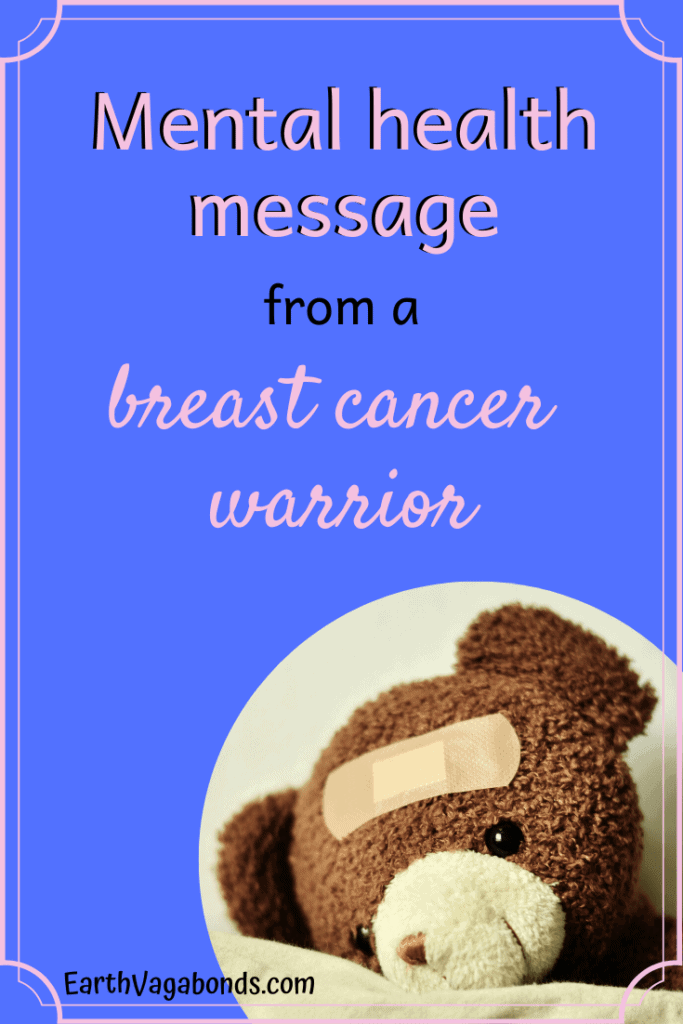Last Updated on October 28, 2024 by Ellen
I was diagnosed with breast cancer in Split, Croatia, in our third year of retired budget travel. Another biannual checkup with a medical oncologist in northern Thailand showed no “evidence of disease.” I am filled with gratitude! And, also inspired to share a mental health message with people.
As many cancer survivors do around their “cancerversary”, I took an inventory of my triumphs and challenges in the time since my diagnosis. I asked myself: am I living the life I want? The answer was: yes and no. If I died tomorrow, what would I regret not doing yesterday? That question tells me what I should be doing today – now.
For me, part of the answer is I’d like to do some creative writing. So in recent weeks, I have made an earnest and consistent effort to do it. If it goes nowhere other than to friends’ screens, that’s OK. I get enjoyment from writing fiction (and nonfiction). I’m grateful for those who have taken time to read a few short stories and offer feedback.
But here, in this space, I’d like to share a true story with you. It’s about my biggest challenge in the last year: my mental health. It seems this topic is more taboo than alcoholism, another disease from which I have suffered. (June 28, 2019, is my 3,363 day of sobriety – isn’t that a cool number?!)
It doesn’t matter why I became an alcoholic. It doesn’t matter why I got cancer. It doesn’t matter why I was diagnosed with mental health disorders. This is what matters: in each case, I accepted I needed help, and I was willing get it.
People see me as strong, capable, blunt. I am those things (although I prefer the word honest over blunt).
An example: ‘Who does this?’ I asked Tedly one day. ‘Who is diagnosed with breast cancer in a foreign country, researches how to have a double mastectomy in a foreign country, recovers while still traveling, and keeps traveling while arranging biannual checkups with medical oncologists in foreign countries? Who does that?’ (I sorta laugh.)
‘You do,’ Tedly answered.
Yes, I am strong and capable. Also, human. Now allow me to be honest, or blunt, if you prefer, because maybe this might help someone else.
For the first time in my life, I suffered panic attacks. They started after our motorbike crash in southern Thailand. I could not cross the street. But even indoors, away from traffic, I was coming apart.
I woke up crying for no reason, and sometimes I burst into tears in public or with friends. I had little desire to do anything at all. I was nearly consumed with black thoughts about the cancer returning – these thoughts took up 50 percent of my time, or more. And then, other black thoughts crept in. That’s when I told Tedly we had to change travel plans. I needed serious help.
In Bangkok, two psychiatrists made the same diagnosis: major depression, anxiety, and post-traumatic stress disorder. Well, shoooot. That sucks. I didn’t want to accept this, but the fact is, these mental health problems are not uncommon in breast cancer patients. The crash pushed me over the edge.
Both doctors suggested a bit of therapy, an antidepressant and Xanax (a sedative), the latter to be taken at the onset of a panic attack. I struggled with idea of taking Xanax because of my alcoholism. I didn’t want to jeopardize years of sobriety with a potentially addictive sedative, but I literally jumped when traffic came too close to me. I cannot be a world traveler, or anything else, if I cannot mentally make it across the street.
I chose to see one of the doctors for some sessions. That helped. We talked through my fear of Xanax. I consulted with other alcoholics and other people close to me. I reluctantly agreed to use the Xanax as needed, only until the antidepressants began to work and the panic attacks stopped. That helped. And I did not abuse these sedatives. To this day I carry a few of them, just in case.
Lexapro (or a generic) is one of only two types of antidepressants I can take while on post-breast cancer hormone blockers. Tamoxifen is a common pill taken by some patients to try to prevent a recurrence, and depression is one known side effect.
Some weeks after I started Lexapro, when we were in Vietnam, I crossed a street for the first time without holding my husband’s or mother-in-law’s hand. Then, I crossed a street on my own in chaotic Ho Chi Minh City traffic (thank you, God). I continued to get better the longer I took antidepressants. I experienced real gratitude again, and I had moments of true joy.
A spiritual friend from Israel who lives in Nha Trang gave me the most significant heartwarming pep talk of my life. He is so freaking awesome. Also, a beautiful world-traveling friend helped me more than she can possibly know when we spent time together in Danang. I have a dear friend who’s in Vancouver and always up for a video chat, and I have the world’s greatest sister. When the student is ready, teachers appear.
I feel good about myself today, all things considered. I’ll keep taking my inventory, and I will stay honest. What’s the point of overcoming all of these challenges if I can’t enjoy life?
My message to anyone suffering debilitating anxiety or major depression, or struggling with PTSD, is this: get help from people who can relate to you, and from people who have medical experience with mental health problems. These are the people who will validate your feelings and offer you strength and hope.
To anyone suffering – this mental health message is written specifically for you. If I can get honest and be willing to get help, you can, too. You are so not alone.
We former (and current) cancer patients, we alcoholics, and we who have survived dark and desperate places, know in our souls that time on Earth is precious, and we understand authentic lives have no room for pretense.

.
.
.
🙂


I think one of the most powerful messages you have conveyed here is that pretense is a waste of our time and so unhelpful when we are hurting.We may be considered (and may actually be, most of the time) strong, independent and resourceful. But focusing on maintains that image, with others and with ourselves when inside we are suffering from anxiety, panic attacks, and depression does not move us in a healing direction. One of the greatest demonstrations of one’s strength is, paradoxically, saying that you can not handle this alone and asking for and accepting help, at a time when it is particularly difficult to do so. Reading this at this moment in time was so valuable to me, and I am so grateful for your ‘bluntness’ – though I might rename it ‘real-ness’. Thank you so much for sharing your experience.
Thank you so much for your uplifting words! I am glad they gave you some measure of relation and comfort.
Your honest self assessment is a gift to all who will read it, especially those of us who live with physical limitations and attendant depression. I love how you have chosen to give it away in order to keep it. Although I no longer can cross a street, I jump each day into the dance that balances my spiritual, mental and physical health needs. My most effective healing technique is free and instantly available: present moment gratitude.
Thank you, thank you, thank you
Mexican mountain blessings, my sister: sobriety and joy!
I love this so much, Connie- thank you! What you have expressed here really touches me. I relate. Until we meet again, sending you lots and lots of love.
???
Wow. I always knew you were special. Your blog is rich with honesty, realism, perseverance and hope. I smile when I think of you. I miss our days working together but glad to see your horizons have expanded beyond measure.
Thank you, AC. Your kind words really mean a lot to me. ?
“It becomes clear that just as it is wrong to enable or support any alcoholic to become re-addicted to any drug, it’s equally wrong to deprive any alcoholic of medication, which can alleviate or control other disabling physical and/or emotional problems.”
Pamphlet 11,”The A.A. Member —Medications and Other Drugs”
10,746 days and counting, one day at a time.
Thanks for sharing and being so honest. I’m a breast cancer survivor & also lived with an alcoholic parent. I’ve had a lot of trauma in my life – depression & anxiety are often in my life. Being honest and talking have really helped me. I’m a work in progress. Love & strength to you x
Thank you, Juliet – and strength and love back to you ?
If I can be blunt, I love your honesty. Love reading your posts and how you share with full force. Such an inspiration. Good thoughts to you and Tedly my friend.
Thank you for the encouragement, Steve!
Your desire to make use of all your experiences, both good (early retirement: “you can do this, too!”) and bad (mental health issues: “seek help when you need it “) for the purpose of helping others is holy and beautiful. Your down-to-earth practical advice is just what suffering people need to hear.
If your question at the end of each day is, “Have I added to the love in the world today?”, I can assure you that the answer is a resounding “yes “, although you may never know how far-reaching your influence has been.
Thank you, mom. Your support, encouragement and love lift me up.
Thank you for sharing. The world needs to hear your story and your message. You are one strong, brave and fierce woman! Stay well. Enjoy life.
Thank you ?
Not many people would have continued travelling. It shows what a strong person you are even if you have days you don’t know it.
Thank you my friend ?
That’s good you received . Congratulations!
Thank you!